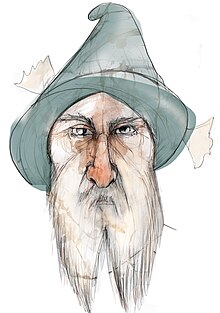Jabir ibn Aflah
Abu Muhammad Jabir ibn Aflah al-Ischbili ( Arabic أبي محمد جابر بن أفلح الإشبيلي, DMG Abū Muḥammad Ǧābir b. Aflaḥ al-Išbīlī , according to other transcriptions also Gabir ben Aflah and Jabir ibn Aflah al-Ishbili ; * around 1100 in Seville ; † around 1160 ), also Latinized as Geber Hispalensis , was a Spanish - Arabic astronomer and mathematician who was known to European scholars through the translations of his works into Latin and therefore played an important role in the further development of mathematics in Europe . Even if other Muslim mathematicians, such as the Persian Abu l-Wafa , made significant mathematical advances, their writings were not translated into Latin and therefore remained unknown to the Western scholars of the time .
Little is known about the life of Jabir ibn Aflah. His place of birth can be inferred from his name addition al-Ischbili ("from Seville") in various sources, and a mention by Maimonides (Arabic name Abu 'Imran Musa ibn Maymun ibn' Ubayd Allah ). The Jewish philosopher , lawyer and doctor Maimonides was born in Córdoba in 1135 and claims to have met ibn Aflah's son. The approximate life data can be derived from this.
Jabir ibn Aflah described two astronomical instruments that can be considered forerunners of the Torquetum . In spherical trigonometry , a mathematical theorem is named after him.
Jabir's criticisms of Ptolemy 's Almagest were known throughout Europe. In his most famous work, Islah al-Majisti /إصلاح المجسطي / iṣlāḥ al-maǧisṭī / 'Correction of the Almagest', his most famous refutation of Ptolemy emerges. Jabir was able to show that Venus and Mars can also stand above the sun , and not just below it, as Ptolemy's model showed. Jabir ibn Aflah was certainly influenced by other Arab authors while writing this work, even if the extent and thus the degree of its originality is no longer comprehensible. There are similarities to the works of Abu l-Wafa and Thabit ibn Qurra .
The work of Jabir ibn Aflah influenced both Western and Eastern scholars. Among others, the Persian astronomer Qutb ad-Din asch-Schirazi , a student of Nasir ad-Din at-Tusi , the Spanish-Arabic philosopher Ibn Ruschd, better known as Averroes , who was born in Cordoba in 1126, integrated Islamic traditions and Greek thought sought. Furthermore Levi ben Gerson (also Gersonides) and Regiomontanus were demonstrably influenced. The latter copied large parts of Ibn Aflah's work in the fourth book of his De triangulis , but withheld his source.
In 1935 the lunar crater Geber was named after him.
Web links
- John J. O'Connor, Edmund F. Robertson : Jabir ibn Aflah. In: MacTutor History of Mathematics archive .
| personal data | |
|---|---|
| SURNAME | Jabir ibn Aflah |
| ALTERNATIVE NAMES | Donor hispalensis; Gabir ben Aflah; Jabir ibn Aflah al-Ishbili Abu Muhammad |
| BRIEF DESCRIPTION | Hispanic-Arabic astronomer and mathematician |
| DATE OF BIRTH | around 1100 |
| PLACE OF BIRTH | Seville |
| DATE OF DEATH | around 1160 |
